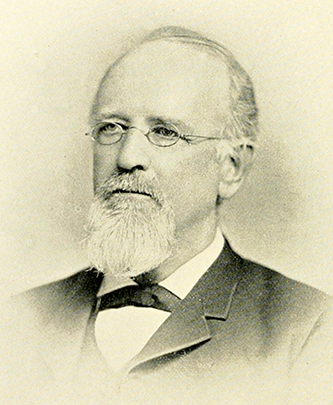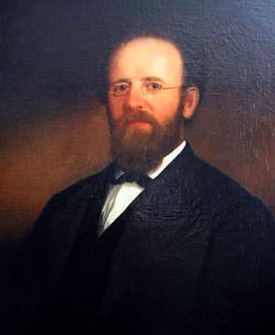5 Oct. 1823–12 Sept. 1898

Robert Paine Dick, jurist and Union leader, was born in Greensboro, the second son of John McClintock and Parthenia P. Williamson Dick. His father was a state superior court judge for twenty years, and his mother came from a prominent Person County family. After attending local schools, Dick received his college preparatory training at the Caldwell Institute and entered the sophomore class of The University of North Carolina, from which he was graduated with distinction in 1843. Choosing law for his professional career, he studied under his father and George C. Mendenhall; in 1845 he began to practice at Wentworth, the seat of Rockingham County.
In 1848 Dick moved to Greensboro. Four years later he began his political career as a delegate to the Democratic National Convention in Baltimore. An energetic Franklin Pierce supporter, he was named U.S. district attorney by Pierce in 1853 and retained the post until 1861. In 1860 he strongly endorsed the candidacy of Stephen A. Douglas at the Democratic conventions at Charleston and Baltimore, refusing to join other state delegates who left the national party or supported the candidacy of John C. Breckinridge. In fact, upon his return to the state, Dick secured the nomination of a Douglas electoral ticket and campaigned tirelessly though unsuccessfully for Douglas's election as the best way to preserve the Union and prevent the secession of southern states.
When actual fighting began in the Civil War, Dick joined with other Union men in the state in voting for an ordinance of secession in the 1861 state convention, although he was never an active supporter of the Confederate cause. By 1862 he supported the Conservative ticket of Zebulon B. Vance, and after Vance's gubernatorial victory he was elected to the Council of State by the legislature. In 1864, recognizing the futility of further resistance to the Union forces, Dick joined the "peace movement" led by W. W. Holden and was elected to the state senate on that platform.

For his loyal Unionist support, Dick was one of twelve North Carolinians summoned by President Andrew Johnson in May 1865 to discuss with him the best mode of restoring the state government to the Union. From this meeting came the presidential decision to appoint W. W. Holden as provisional governor of the state, and the formation of a close political alliance and friendship between Holden and Dick that would last the remainder of their lives. Dick was tendered and accepted the office of U.S. district judge, but resigned when he found himself unable to take the "ironclad" oath of loyalty, having served in the state legislature during the time of the Confederacy. He also declined a Holden appointment as a provisional judge, although he did serve as one of the leaders at the 1865–66 constitutional convention. By 1866 he was one of the leading advocates of the Howard or Fourteenth Amendment, and he strongly supported Holden in his efforts to have the state rejoin the Union under the terms of the amendment. He also participated in the formation of the Republican party in the state and campaigned tirelessly for its successful 1868 victory. In April 1868 he was elected a justice of the North Carolina Supreme Court and held that position until 1872, when he was appointed a federal district judge by President Grant. He served in this capacity with great distinction but was forced to resign in 1898 because of poor health.
As associate justice of the state supreme court Dick helped mold and direct the new mode of legal pleading and procedure introduced by the 1868 constitution, as well as deciding the many difficult questions arising out of the new system of jurisprudence. As judge of the district court he was recognized for his kindly temper in administrating the internal revenue laws of the United States. Also, for many years Dick and John H. Dillard conducted a private law school in Greensboro which was noted for the outstanding legal training given to its many young students.
Judge Dick was acclaimed for his scholarship in history and biblical literature, and for many years he was an ardent advocate of temperance reform. He was a faithful member and a ruling elder of the First Presbyterian Church in Greensboro. He died of Bright's disease and was buried in Green Hill Cemetery, Greensboro. In 1848 he had married Mary Eloise Adams of Pittsylvania County, Va., and from this union there were five children: George A., Samuel W., Mrs. R. M. Douglas, Mrs. W. E. Stone, and Mrs. Emma D. Williams.